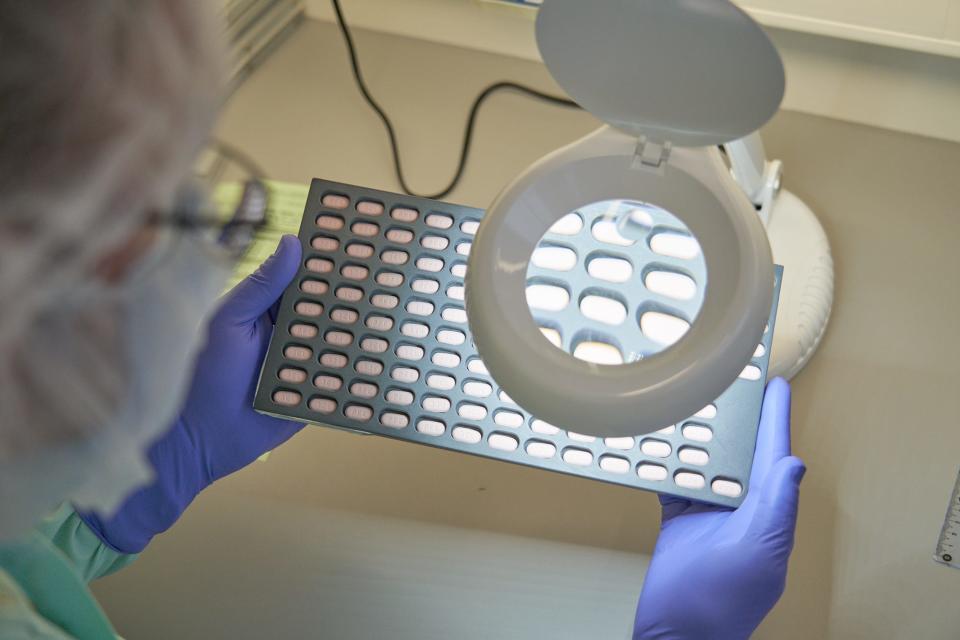COVID-19 treatments are free and can help reduce hospitalizations in Pueblo
- Oops!Something went wrong.Please try again later.
New COVID-19 treatment options are becoming more readily available and the medications can help Puebloans reduce their risk of hospitalization.
During the past week, “hospitalizations have seen an uptick,” said Sarah Joseph, Pueblo Department of Public Health and Environment public information officer. Hospitalizations went from 12 patients down to five during the week of July 17-23 and increased from four to seven during the week of July 24-30.
What Puebloans may not know is that new treatments for COVID-19 patients are not only helping people recover and avoid severe symptoms or hospitalization, they are offered free of charge in Colorado.
Statistics show that Colorado residents have proven to be more willing to try the antiviral medications now available. Colorado exceeds the national average for Paxlovid and Renal Paxlovid administrations by an average of 13% each week and Evusheld administrations by 22%, according to Colorado Department of Public Health and Environment statistics.
Closer to home, despite a slight uptick in hospitalizations, Pueblo County’s numbers are moving in the right direction. The number of positive COVID-19 cases dropped by 17% July 24-30 compared with the previous week, Joseph said.
More COVID news:COVID-19 vaccinations for youngest children available in Pueblo starting Monday

How is Colorado managing to stay ahead of the national average for antiviral usage?
“We’ve done our best to get the message out that treatments are available, they are free and easily accessible,” said Dr. Eric France, CDPHE medical director. “You should be able to call your doctor’s office to get them immediately or do a telehealth visit or check in with your pharmacist to see if they can prescribe them.”
“They are effective and important. If you are within the first five days of having symptoms, getting an oral prescription for Paxlovid, for example, reduces your chances of being hospitalized by 88%,” and also reduces chances of serious illness, France said.
Those who test positive for COVID-19 also have the option of getting monoclonal antibody shots, so it is important for patients to speak with their health care providers about the best option for them.
Medical conditions that qualify patients for treatment include diabetes, asthma or any chronic medical condition. Patients who are 60 or older, overweight, or who smoke also qualify for treatments.
The instances of breakthrough infections like the one experienced by President Joe Biden are not common, France said. Biden received Paxlovid treatments and tested negative, only to test positive for the virus again a few days later.
“The medicine blocks the ability of the virus to grow. After five days you stop taking it, so if there is still some virus there it might start growing again,” he said.
“The good news is you’ve been on medication for five days and your body’s immune system was starting to fight off the infection, so even if it comes back with a rebound case, it tends to be mild. That is still a successful treatment,” France explained.
France said right now the Omicron ba.4 and ba.5 variants are most prevalent in Colorado.
“It is kind of chugging along, but hospitalizations are not too high. We should not expect a big spike come October because there won't be a lot of people around who are still susceptible,” to those variants, he said.
“I am not sure we will ever have a nail in the coffin for this coronavirus. It is likely it may just evolve to something we get a common cold or flu virus from or it is always possible there will be a new variant in the future,” he said.
Vaccinations continue to be an important tool
Vaccinations are still highly recommended for those with complex health issues.
“People who are hospitalized today often have other complex medical conditions,” France said.
In southeastern Colorado, the state's mobile vaccine buses have been extended and will continue to serve the region for the remainder of the year. The buses will carry the vaccine for children ages 6 months and older, as well as adults.
After two primary vaccinations and two booster shots, France himself tested positive for the virus while on a trip to Europe in May. Luckily, he said his symptoms were mild and only lasted a couple of days.
“I sure was thankful I didn’t end up in a hospital in a foreign country,” he said.
What does the future hold for protection against COVID?
“The vision of one shot in the fall to protect us against both COVID and flu is very possible. I think they are already studying the combination and they are learning about the safety of that and whether you have more reactions or less reaction,” France said.
"Stay tuned for the scientists to do their work and figure out what the safest and most convenient way is to protect us from both flu and COVID in the future,” he added.
To find out more about COVID vaccines, treatments and how to find telehealth providers go to covid19.colorado.gov/for-coloradans.
Trending:Lady A cancels tour, pulls out of 2022 Colorado State Fair show in Pueblo
Chieftain reporter Tracy Harmon covers business news. She can be reached by email at tharmon@chieftain.com or via Twitter at twitter.com/tracywumps.
This article originally appeared on The Pueblo Chieftain: New COVID-19 treatments are free, can help Puebloans avoid hospital

